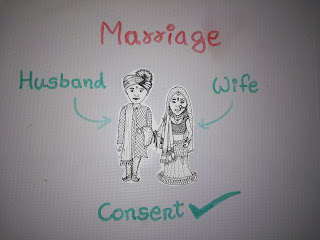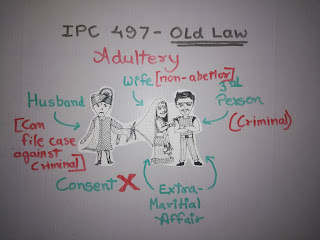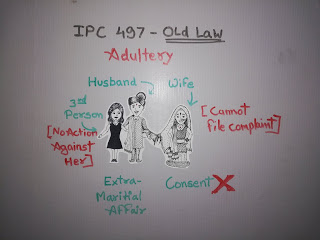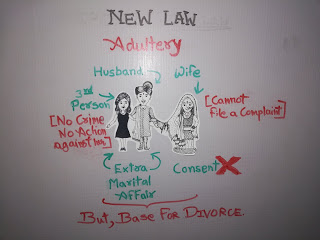CJI Dipak Misra retired last month. Before retiring he gave a series of crucial decisions among which the Decision to scrap 497 was one of them. In the following we will be covering the major aspects of the law along with the advancement made in the law.
Marriage: When there is a couple who builds a consent within themselves and ties the knot of their committed relationship then it is generally called as a Marriage. We must note here that the consent is a very important aspect here. even if there is no consent from either side, the relationship collapses.
 |
| Pic1 |
OLD LAW
Adultery IPC 497 : When a person has a sexual intercourse with the wife of another man without the consent of that man is called as Adultery. The man who is involved in the adultery is guilty of the offence of adultery, who shall be imprisoned or fined or both under IPC 497. In this case the women was not considered as the abettor. Abettor means one who influences or convinces someone to commit the crime.
 |
| Pic2 |
In the earlier law there was a slight difference which showed discrimination between a man involved in the adultery and a woman involved in the adultery. As per the law, when a married man had an sexual intercourse with another women, without the consent of his wife, the law didn’t applied there. This clearly discriminated between the man and the woman. Even the woman did not had the freedom. Whereas the woman involved in the adultery either married or bachelor cannot be charged under IPC 497. This shows that men had the freedom in adultery whereas the women did not.
 |
| Pic3 |
NEW LAW
When a PIL was filed in December 2017, to strike down the law, the Supreme Court accepted it. An argument was laid which stated the violence of article 14 and article 15 of the Constitution.
Article 14:- Equality before law The State shall not deny to any person equality before the law or the equal protection of the laws within the territory of India Prohibition of discrimination on grounds of religion, race, caste, sex or place of birth
Article 15:- The State shall not discriminate against any citizen on grounds only of religion, race, caste, sex, place of birth or any of them
Listening to the arguments of both the parties, the Supreme Court then decided to scrap down the law. There were few observations by the Judges.
- Under article 198, law gave only the husband the right to file a case against the man involved in the act of adultery.
- That concludes to a belief that the woman belong to her husband only.
- That does not gave the woman the freedom for her own thoughts and feelings, even if she voluntarily does a consented intercourse.
On 27th September 2018 a Five Judge Constitution Bench of the Supreme Court of India decided to scrap this IPC 497.
Now according to the new law if a married woman has a sexual intercourse with another man then the husband cannot file a case against the man involved in the adultery. But on the basis of adultery he can demand Divorce from his wife.
 |
| Pic4 |
Also, it is very important to note the changes. Equality before law with Gender Neutrality is taken care of by the Supreme Court of India.
- Now both the partners are free to have sexual intercourse with the person of their choice.
- No legal action will be taken against the ones involved in the Adultery.
- But this wont mean Adultery is legal.
- Adultery still remains the base for Divorce.
While reading the judgement, Chief Justice Dipak Misra said, “it (adultery) cannot be a criminal offence,” however it can be a ground for civil issues like divorce.
 |
| Pic5 |

